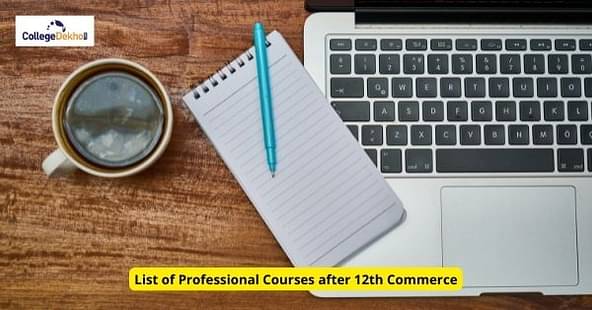Students from a Commerce background are aware of the professional courses that they can take after completing their Class 12th. Like CA, CS are two important professional courses after 12th Commerce, we have listed down all the other courses that you can choose in this article.
- Courses after class 12th Commerce
- Financial Risk Management (FRM): Details
- Chartered Institute of Management Accountants (CIMA): Details
- Associate of Chartered Certified Accountants (ACCA): Details
- Chartered Accountant (CA): Details
- Company Secretary: Details
- Chartered Financial Analyst (CFA): Details
- Certified Management Accountant (CMA): Details
- Certified Financial Planner (CFP): Details
- Bachelor of Commerce (B.Com): Details
- Bachelor of Arts and Bachelor of Legislative Laws (BA LL.B): …
- Bachelor of Business Administration (BBA): Details
- Faqs

Choosing a professional course after 12th commerce is difficult as it’s a choice of a lifetime. Commerce is quite a trending stream among the new age students as it has a wide variety of course and career options. Most students take up courses that they’re not interested in and end up changing them in future. Most commerce students are aware of professional courses such as CA, and CS but today we’ll discuss a list of professional courses that students can choose from after their CBSE Class 12 commerce.
Commerce as a career can be very demanding and lucrative. It deals with subjects like accounting and finance, cost and taxation, audition, banking and insurance, etc. It’s a perfect start for students wanting to start their own business, and learn about banking, marketing, and investing to name a few. There are various bachelor and professional courses after 12th Commerce available for students, and we’re here to help them narrow down the one they’re really interested in.
Courses after class 12th Commerce
Commerce provides a range of courses to study from. From selling to investing, students have a huge scope to learn as well as apply it in real-life situations. The courses can be divided into two sections- Bachelor Degree and Professional Degree. Bachelor’s degree prepares students for research-oriented careers whereas Professional degree prepares students for careers in specific fields.
Here’s a list of top professional courses and all necessary details about them.
- Financial Risk Management (FRM)
- Chartered Institute of Management Accountants (CIMA)
- Associate of Chartered Certified Accountants (ACCA)
- Chartered Accountant (CA)
- Company Secretary (CS)
- Chartered Financial Analyst (CFA)
- Certified Management Accountant (CMA)
- Certified Financial Planner (CFP)
- Bachelor of Commerce (B.Com)
- Bachelor of Arts and Bachelor of Legislative Laws (BA LL.B)
- Bachelor of Business Administration (BBA)
Financial Risk Management (FRM): Details
FRM or Financial Risk Management is a course offered by the Global Association of Risk Professionals (GARP, USA). Students wanting to learn about finances and risks related to them can take up this course. The demand for FRM is extremely high in every industry.
FRM Eligibility
There’s no basic criteria to appear for the FRM exam. Students in their first year of undergraduate study can also appear for Part 1 of FRM exam. However, there are certain criteria to attain the degree.
- One must have cleared Level 1 and 2 of the program within 4 years of applying for part 1 exam.
- A minimum of 2 years of work experience within 5 years of clearing part 2 exam, is required.
FRM Exam Pattern
FRM exam has 2 parts- Part 1 and Part 2. The exam is conducted twice a year- on the third Saturday of May and November. Students can apply for both the parts on the same day, however, it is not recommended due to the lengthy syllabus.
Particulars | FRM Part 1 | FRM Part 2 |
|---|---|---|
No. of questions | 100 MCQs | 100 MCQs |
Duration of the exam | 4 hours | 4 hours |
FRM is a paper-based exam with 100 MCQs. There’s no negative marking for wrong answers.
FRM Registration Fee
The table will show you the FRM registration fee-
Period | Fee in US Dollar | Fee in INR |
|---|---|---|
Early | $350 | Rs. 21,000 |
Standard | $475 | Rs. 28,500 |
Late | $650 | Rs. 39,000 |
It’s best for students to pay the fee at an early stage as they can save a ton of money.
FRM Exam Syllabus
The syllabus for Part 1 and Part 2 of the exam is given below along with the weightage of each section.
FRM Part 1 Syllabus | Weightage |
|---|---|
Foundation of Risk Management | 20% |
Financial Markets and Products | 30% |
Quantitative Analysis | 20% |
Valuation and Risk Models |
30%
|
FRM Part 2 Syllabus | Weightage |
|---|---|
Market Risk Management | 20% |
Operational and Integrated Risk Management | 20% |
Credit Risk Management | 20% |
Liquidity and Treasury Risk Measurement and Management | 15% |
Current issues in financial markets | 10% |
Risk management and investment management | 15% |
Chartered Institute of Management Accountants (CIMA): Details
Students wanting to make a career in management accounting can opt for CIMA. This course aims to clear all the complicated concepts that you deal with while accounting or solving some financial issues.
CIMA Eligibility
CIMA can be pursued by students in their first year of college degree. Students with a graduation degree can get all four CIMA levels in two years.
CIMA Exam Pattern
Here’s all the important information for the 4 levels of the CIMA exam.
CIMA exam pattern | Objective type exam | Case study exam |
|---|---|---|
Exam at each level | 3 | 1 |
Duration of the exam | 90 min | 180 min |
Exam Frequency | Daily based on availability at Pearson Centre | 4 times a year- February, May, August, November |
Result Declaration | Immediately | After 1 month of the exam |
CIMA Exam Syllabus
Candidates appearing for the CIMA exam can clear all four levels in 2-2.5 years. Here’s the syllabus for the CIMA exam.
Certificate Level |
|
|---|---|
Operational Level |
|
Managerial Level |
|
Strategic Level |
|
Associate of Chartered Certified Accountants (ACCA): Details
ACCA is a globally recognized course in over 78 countries. It trains one to perform strategically at senior management levels and has a well-designed curriculum. It provides candidates with relevant knowledge and skills. ACCA or Association of Certified Chartered Accountants is a global body that provides students with a ‘Certified Chartered Accountant’ certification. Individuals choose ACCA because they have the ability in the fields of business and accounting.
ACCA Eligibility
An individual must be 18 years old to receive an ACCA certificate. Students who have passed class XII from a recognized board of education with a minimum of 65% marks in English, Mathematics and Accountancy and over 50% marks in two other subjects are eligible.
ACCA Exam Pattern
ACCA exam is divided into 3 levels- Applied Knowledge, Applied Skills & Strategic Professional, with 13 papers in total.
| ACCA Exam | Duration | Passing Marks | Total Marks |
|---|---|---|---|
ACCA Foundation Exam | 2 hours | 50% | 100 |
ACCA Applied Knowledge Exam | 2 hours | 50% | 100 |
ACCA Applied Skills Exam | 3 hours | 50% | 100 |
ACCA Strategics Professional Exam | 3 hours apart from 1 paper (4 hours for that other paper) | 50% | 100 |
ACCA Syllabus
Here’s the syllabus for all the first level of the ACCA exam.
Knowledge Level | Paper 1 |
|
|---|---|---|
Paper 2 |
| |
Paper 3 |
|
Chartered Accountant (CA): Details
ICAI regulates the profession of Chartered Accountancy in India. It is one of the most common professional courses in India and lakhs of students appear for its foundation exam each year. The course prepares students to work in the accounting and taxation field of business. Here are the important details regarding the CA course.
Chartered Accountancy Eligibility
The eligibility criteria for students wanting to appear for the CA examination is-
- The student must have passed class 12 before applying for the CA foundation exam.
- The candidates must register themselves with the Board of Studies and complete 4 months of study period before appearing for the CA foundation exam.
Chartered Accountancy Exam Pattern
A candidate needs to pass all three levels of CA i.e Foundation, Intermediate, and Finals, in order to obtain the degree. The CA Foundation has four papers and the candidates have to clear all of them in order to appear for the intermediate level. CA Intermediate has two groups- Group I and Group II, with four papers each and same is the case for CA Finals. The candidates must pass each group in one sitting. All CA exams are conducted twice a year- May and November.
CA Exam Level | Number of Papers | Time Duration |
|---|---|---|
CA Foundation | 4 | Paper 1 and 2- 3 hours Paper 3 and 4- 2 hours |
CA Intermediate | 8 | 3 hours for all papers |
CA Finals | 8 (Paper 6 is elective) | Paper 1 to 5, 7 & 8- 3 hours Paper 6- 4 hours |
CA Registration Fee
Here’s the registration fee for all the levels of the CA exam.
CA Exam Level | Registration Fee | Application Fee |
|---|---|---|
CA Foundation | Rs. 9,800 | Rs. 1,500. Late payment- Rs. 600 extra. |
CA Intermediate | Rs. 11,000 for one group Rs. 15,000 for both groups | Rs. 1,500 for single group Rs. 2,700 for both groups Rs. 600 for late fee payment |
CA Finals | Rs. 22,000 | Rs. 1,800 for single groups Rs. 3,300 for both groups |
CA Syllabus
Here’s the syllabus for all levels of the exam-
CA Exam | CA syllabus | Marks |
|---|---|---|
CA Foundation |
| 100 marks for each paper i.e. 400 in total |
CA Intermediate |
| 100 marks for each paper i.e. 800 in total |
CA Finals |
| 100 marks for each paper i.e. 800 in total |
Company Secretary: Details
A company secretary ensures smooth administration of a company. They are responsible for the legal and financial regulation of the company, management of shareholders and communication, etc. There are more than 4 lakh students appearing for the CS foundation exam every year. Many commerce students opt for the Company Secretary course as it is one of the most popular professional courses after 12th Commerce. Here are more details regarding the CS exam.
Company Secretary Eligibility Criteria
Students wanting to appear for the CS foundation exam, now known as CSEET, should-
- Qualify class 12 from any recognized state/national board of education.
- Students can also pursue CS after graduation. In that case, they won’t have to appear for the CSEET exam.
Company Secretary Exam Pattern
The CS exam has three levels- CS Executive Entrance Test (CSEET), Executive Program, and Professional Program. The exam is conducted twice every year- June and December.
CS Exam Level | Number of Papers | Qualifying Marks |
|---|---|---|
CSEET | 4 | 40% in each paper and 50% in aggregate |
CS Executive Program | Module I and Module II- 4 paper each | 40% in each paper and 50% in aggregate |
CS Professional Program | Module I and Module II- 4 paper each | 40% in each paper and 50% in aggregate |
Company Secretary Total Fee
The registration fee for all three levels of the CS Program is given below-
Company Secretary Executive Entrance Test Fee | Rs. 10,600 |
|---|---|
CS Executive Program | Rs. 10,600 |
CS Professional Program | Rs. 13,000 |
Company Secretary Syllabus
Here’s the syllabus for all three levels of the CS exam-
CS Exam | CS Syllabus | Marks |
|---|---|---|
CSEET |
| 100 marks for each paper i.e. 400 in total |
CS Executive Program |
| 100 marks for each paper i.e. 800 in total |
CS Professional Program |
| 100 marks for each paper i.e. 800 in total |
Chartered Financial Analyst (CFA): Details
Chartered Financial Analyst commonly known as CFA is gaining popularity among commerce students. It is a globally recognized degree and is considered tougher than CA or CS courses. CFA looks into the matters of trading, accounting, auditing, etc. Let’s go through all the necessary information regarding CFA.
Chartered Financial Analyst Eligibility Criteria
Here’s the eligibility criteria for students wanting to pursue CFA-
- Candidates must have a Bachelor’s degree or be in their final year of Bachelor’s degree at the time of registration, or
- Candidates who have a total of 4 years of work experience can also apply.
- Candidates must have a valid international passport.
Chartered Financial Analyst Exam Pattern
The table below has all the necessary information regarding CFA Level 1 exam pattern-
Particulars | Details |
|---|---|
Exam Frequency | Four times a year- Feb, May, Aug, and Nov |
Format of Questions | MCQs |
No. of Questions Asked | Section 1- 90 MCQ, Section 2- 90 MCQ i.e. a total of 180 MCQ |
Exam Duration | Split into two session of 2 hours 15 mins each i.e. a total of 4.5 hours |
Chartered Financial Analyst Registration Fee
The registration fee of CFA alone is Rs. 1,03,000. This doesn’t include the tuition fee. It is easily one of the most expensive professional courses in our list.
Chartered Financial Analyst Syllabus
The level 1 of CFA exam includes subjects like-
- Ethics and professional standard
- Quantitative methods
- Economics
- Financial reporting and analysis
- Corporate finance
- Equity
- Fixed income
- Derivatives, etc.
Certified Management Accountant (CMA): Details
The name itself suggests that a CMA is responsible for managing accounts along with taking decisions regarding the finances of the company. The UGC has resolved that CMA will be considered a postgraduate qualification. The CMA course is designed in a way to train individuals for working in different industries and corporate offices. The CMA course credentials are issued by the Institute of Cost Accountants of India (ICAI). There are 3 stages of the CMA course - CMA Foundation Level, CMA Intermediate Level and CMA Final Level.
Certified Management Accountant Eligibility Criteria
The eligibility criteria for CMA are given below separately for 3 stages-
CMA Foundation Level
Candidates have to pass Class 10 or equivalent examination followed by the Class 12 examination from a recognized board. Students who received National Diploma in Commerce Exam (AICTE or by any recognized board) can also apply.
CMA Intermediate Level
To apply for CMA intermediate level, students must have passed SSC or equivalent examination followed by a Graduation degree (in any stream). Students have to clear the foundation or entry-level course by ICAI.
CMA Final Level
Candidates who want to study the CMA Final level must have passed the intermediate level.
Certified Management Accountant Exam Pattern
Like the CA course, CMA also has three programs- Foundation, Intermediate, and Final- that the candidates need to qualify in order to acquire the degree. The exam is conducted twice a year- June and December.
CMA Exam Level | CMA Exam Pattern |
|---|---|
CMA Foundation |
|
CMA Intermediate and Final |
|
Certified Management Accountant Course Fee
The course fee for each level of the CMA exam is given below-
CMA Exam Level | Course Fee |
|---|---|
CMA Foundation | Rs. 6,000 |
CMA Intermediate | Rs. 23,100 in total |
CMA Final | Rs. 25,000 in total |
Certified Management Accountant Syllabus
The syllabus for all level of the CMA exam is given below-
CMA Exam Level | Syllabus |
|---|---|
CMA Foundation |
|
CMA Intermediate |
|
CMA Final |
|
Certified Financial Planner (CFP): Details
A certified financial planner will have expertise on the areas of taxes, estate planning, insurance, financial planning, etc. Let’s go through all the details regarding CFP.
Certified Financial Planner Eligibility Criteria
The eligibility criteria for CFP is given below-
- Candidates who have passed class 12 from a recognized board of education can apply for the exam. They should pass all five exams covering six modules to be certified as a CFP.
- Candidates who have cleared the CA Intermediate Level, CFA, CS, LL.B can directly appear for the fifth exam i.e. Advanced Financial Planning to earn the degree.
Certified Financial Planner Exam Pattern
The certified financial planner exam is a MCQ based exam with 170 questions. The time duration of the exam is 3 hours. The exam is conducted twice a year- July and November. The registration for July session begins from March and for November session candidates can start applying for July 14 onwards.
The CFP exam is 3 hours long with 85 MCQs and is a computer based exam.
Certified Financial Planner Course Fees
The registration and course fee are given below-
Particulars | Details |
|---|---|
Registration Fee | Rs. 16, 385 |
Exam Fee for first 4 paper | Rs. 4,130 per exam per attempt |
Exam fee for 5th paper | Rs. 8,260 per attempt |
Certification Fee | Rs. 7,080 |
Certified Financial Planner Syllabus
The syllabus for CFP includes-
- Financial Planning
- Insurance Policies
- Risk Analysis
- Insurance Concepts
- Investment vehicles
- Investment strategies
- Estate Planning
- Tax Computations, etc.
Bachelor of Commerce (B.Com): Details
One of the most popular courses among Commerce students is B.Com. The course will allow the candidates to specialise in a specific domain of commerce. Candidates studying B.Com covers a wide range of topics related to business, finance, economics, accounting, marketing, human resources and management.
B.Com Eligibility Criteria
Candidates need to complete their 10+2 with any stream from a recognised board of education. There is no minimum aggregate marks requirement in Class 12th but it is good to have an overall percentage of 50% or above to get admission to institutions that admit candidates based on merit in the qualifying exam.
B.Com Exam Pattern
Most colleges in India accept students for the B.Com degree based on their merit, however, some colleges conduct entrance exams for admission. Find here the general exam pattern for the B.Com exam.
Exam Duration | 3 hours |
|---|---|
Number of Questions in exam | 150 questions |
Marking Scheme | +4 marks for correct answer -1 mark deducted for wrong answer |
Exam Mode | Computer-Based Test (CBT) |
Medium of question paper | English |
B.Com Syllabus
Check here the B.Com syllabus for the entrance exams that are conducted along with the weightage.
Subject | Weightage |
|---|---|
General English | 25% |
Logical Reasoning | 25% |
Data Interpretation | 35% |
General Awareness | 15% |
Bachelor of Arts and Bachelor of Legislative Laws (BA LL.B): Details
BA LL.B degree deals with Humanities and Law streams and the law programme enables students to enrol in classes on history, sociology, administrative law, criminology, family law, and other legal subjects. In this 5-year course, students get to learn about various arts subjects like Indian History, Political Science, English/ Hindi, Economics, Sociology, World History, and Sociopolitical Issues along with specialized courses in administrative law and legislature of the country.
BA LL.B Eligibility Criteria
To study BA LL.B, students need to complete their Class 12 with at least 50% to 60% aggregate marks in any stream. However, there is no specific age requirement to study the law course.
BA LL.B Exam Pattern
BA LL.B exam pattern differs for different law entrance exams that are conducted in India. However, the number of questions and the marks allotted for the exam is almost the same in most entrance exams.
Parameter | Detail |
|---|---|
Mode | Offline |
Duration | 2 Hours |
Language | English |
Type of Questions | Multiple Type Questions (MCQs) |
Number of Questions | 120 |
Marking Scheme | For every correct answer: +1 For every incorrect answer: -0.25 For every unattempted question: 0 |
Total Marks | 120 marks |
BA LL.B Syllabus
Take a look at the BA LL.B syllabus from the table below for the entrance exams that are conducted.
Section | Syllabus |
|---|---|
English Language |
|
Current Affairs and General Knowledge |
|
Legal Reasoning |
|
Logical Reasoning |
|
Quantitative Techniques |
|
Bachelor of Business Administration (BBA): Details
Bachelor of Business Administration or BBA is a 3-year undergraduate degree course created to provide knowledge of business management and detailed aspects of running a company. BBA is one of the most popular bachelor’s degree programs for students who have passed class 12th from any stream, i.e. Science, Commerce, and Arts. The subject is a combination of business-related & generic courses with popular specializations including Marketing, Finance, HR Management, Supply Chain Management and Information Technology
BBA Eligibility Criteria
Students just after Class 12th can apply for the BBA course. To get into the BBA course, aspirants should have passed their Class 12th exam from any stream (Science, Arts, or Commerce) from a recognized board. They need to score a minimum aggregate of 50% marks in Class 12th. However, some top colleges in India have set the minimum qualifying marks to 60%. The BBA course has an age limit where general category candidates need to be between 17 to 22 years and reserved categories between 17 to 24 years.
BBA Exam Pattern
The entrance exam for the BBA course usually have 3 sections with a time duration of 100 to 120 minutes. The 3 sections are Quantitative & Numerical Ability, Reasoning & General Intelligence, and Proficiency in the English Language.
Section | Total Marks | Number of Questions | Time in Minutes |
|---|---|---|---|
Reasoning and General Intelligence | 40 | 40 | 100 Minutes |
Quantitative and Numerical Ability | 40 | 40 | |
Proficiency in English Language | 40 | 40 | |
Total | 120 | 120 | 100 |
BBA Syllabus
The detailed syllabus for the exam for the BBA course has been discussed below.
English Language | |
|---|---|
Subject | Topic |
Reading Comprehension | 3 passages and 5 questions with each passage |
Vocabulary | Correctly identifying the meaning of underlined words in sentences |
Error Recognition | Grammatical Structure and Usage error-based questions |
Contextual Usage | Using appropriate words as per the context |
Sequencing of Ideas | Putting Jumbled Sentences into Order |
Quantitative and Numerical Ability | |
Number System | Numer Series Fractions Surds and Decimals |
Algebra | Algebraic Identities Sequence and Series (AP & GP) Linear and Quadratic Equations |
Arithmetic | Percentage Ratio and Proportion Profit, Loss, and Discount Time, Work, and Distance Compound Interest and Annuities Areas and Volumes of 2D and 3D Figures |
Trigonometry | Trigonometric Ratios and Identities Heights and Distances |
Elementary Statistics & Probability | Mean, Mode and Median Measures of Dispersion |
Sets and Functions | Sets Venn Diagrams Operations on Sets and Application Functions |
Reasoning & General Intelligence | |
Data Interpretation | Questions based on the information given in graphs and charts. |
Data Sufficiency | Analyzing whether the given information is sufficient to solve a question. |
Critical Thinking | Questions based on Problem Solving and Decision Making. |
Numerical Reasoning | Questions based on Venn Diagrams and Mathematical Equalities. |
Verbal and Logical Reasoning | Judging the validity of Arguments based on given Statements and deriving conclusions based on given premises. |
Spatial Reasoning | Figure Analogy Figure Series Figure Matching / Classification |
We hope this article was helpful. In case of any query, feel free to head to our QnAZone. For more such information, stay tuned to CollegeDekho .
Are you feeling lost and unsure about what career path to take after completing 12th standard?
Say goodbye to confusion and hello to a bright future!

FAQs
To get into the BBA course, aspirants should have passed their Class 12th exam from any stream (Science, Arts, or Commerce) from a recognized board. They need to score a minimum aggregate of 50% marks in Class 12th.
The CMA course is divided into 3 levels, Foundation, Intermediate and Final. The CMA Foundation course fee is Rs 6000, the CMA Intermediate course fee is 23100 and the CMA Final course fee is Rs. 25,000 in total.
The important topics that you have to study for the CIMA exam are Fundamentals of Business Economics, Fundamentals of Financial Accounting, Organizational Management, Financial Reporting and Taxation, Project and Relationship Management, Advanced Management Accounting, Strategic Management, Risk Management, Financial Strategy, etc.
After completing the CFA course, candidates can choose to work with a lot of companies. The salary of the CFA varies based on their skills and experience. Some of the high-paying jobs after CFA are Risk Managers, Private Bankers, Business Consultants, Portfolio Managers, Chief Financial Officers, Investment Managers, etc.
In the BA LL.B course curriculum, students get to study history, sociology, administrative law, criminology, family law, and other legal subjects. As it is a mixture of arts and legal subjects, they learn about various arts subjects like Indian History, Political Science, English/ Hindi, Economics, Sociology, World History, and Sociopolitical Issues along with specialized courses in administrative law and legislature of the country.
If you have passed class 12 from a recognized board, then you can apply for the CFP exam. However, you need to pass all five exams covering six modules to be certified as a CFP. those who have cleared the CA Intermediate Level, CFA, CS, LL.B can instantly appear for the fifth exam i.e. Advanced Financial Planning to earn the degree.
To become a certified CA, students have to complete 3 levels designed by the ICAI. Those who want to appear for the foundation examination need to pass Class 12 and complete a four months study period after the registration of CA. But, people who want to take entry through the direct route need to have at least 55% marks in their undergraduate/postgraduate Commerce degree.
If you have passed class 12 from a recognized board, then you can apply for the CFP exam. However, you need to pass all five exams covering six modules to be certified as a CFP. those who have cleared the CA Intermediate Level, CFA, CS, LL.B can instantly appear for the fifth exam i.e. Advanced Financial Planning to earn the degree.
A CMA course is quite a lucrative career in the field of business accounting. The course functions on Management, Strategy, Regulatory Framework and Financial Reporting. The CMA course is divided into 3 levels, Foundation, Intermediate and Final. The CMA Foundation course fee is Rs 6000, the CMA Intermediate course fee is 23100 and the CMA Final course fee is Rs. 25,000 in total.
A CS is in charge of the smooth administration of a particular company.
- For the ICSI Company Secretary foundation course, the interested candidates must have passed a 10+2 or equivalent examination from a recognized board although there is no minimum percentage required.
- To study the ICSI Company Secretary Executive course, all the candidates must pass the CSEET (Company Secretary Executive Entrance Test) examination and they must be of 17 years of age or above.
- Those who want to study the ICSI Company Secretary professional course must successfully pass the ICSI Company Secretary Executive examination.
A CA is a professional person who practices auditing, accounting, taxation and financial assessment for an organisation or as an individual. To become a certified CA, students have to complete 3 levels designed by the ICAI. Those who want to appear for the foundation examination need to pass Class 12 and complete a four months study period after the registration of CA. But, people who want to take entry through the direct route need to have at least 55% marks in their undergraduate/postgraduate Commerce degree.
CFA or Chartered Financial Analyst is the most sought-after career in the field of finance and investment management. Individuals who study CFA gain insight into the financial markets and add value to their skills. The CFA course is divided into 3 levels, CFA Level I, CFA Level II and CFA Analyst Level III. The Chartered Financial Analyst Institute offers CFA credentials to students. The CFA exam comprises subjects like Economics, Money Management, Accounting and Security Analysis.
The four levels of the CIMA exam have to be completed within 2-2.5 years. The important topics that you have to study for the CIMA exam are Fundamentals of Business Economics, Fundamentals of Financial Accounting, Organizational Management, Financial Reporting and Taxation, Project and Relationship Management, Advanced Management Accounting, Strategic Management, Risk Management, Financial Strategy, etc.
To appear for the FRM exam, there are no basic criteria needed. Candidates who are in their 1st year of undergraduate courses can appear for Part 1 of the FRM exam. Although, students have to clear Levels 1 and 2 within 4 years of applying for the FRM Part 1 examination. With this, students must have 2 years of work experience within 5 years of completing their Part 2 exam.
Companies are looking for opportunities to minimize their risks and an FRM does exactly that. An FRM implements measures to control the impact of the outcomes that damage the company, be it financial or physical assets. The Financial Risk Management course is offered by the Global Association of Risk Professionals. The demand for FRMs is really high in today’s world.
After completing the CFA course, individuals can opt for quite a lot of career prospects. The salary of the CFA varies based on their skills and experience. Some of the high-paying jobs after CFA are Risk Managers, Private Bankers, Business Consultants, Portfolio Managers, Chief Financial Officers, Investment Managers, etc.
Commerce is quite a lucrative career and some students might get bored of the usual B.Com, BBA, BA LL.B and other bachelor’s degree programmes. Commerce has a bright future scope and provides a high salary for students who choose professional courses. There are a variety of professional courses available for the students, you have to just check the criteria, and admission procedure and apply for your favourite course.
Was this article helpful?





















Similar Articles
ICAI CA Foundation Course: Dates, Application Form, Eligibility, Syllabus, Admit Card, Result
Is 200 marks good in CA Foundation?
What is the passing criteria for CA Foundation exam?
How CA Foundation helps in CA Intermediate exam?
Is CA Foundation compulsory for CA aspirants?
Who is eligible for direct entry into the CA Intermediate course?